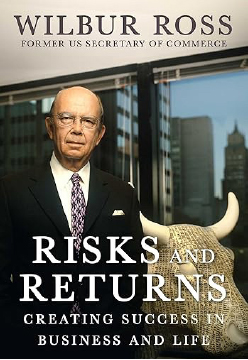WILBUR ROSS
Tales From The Bankruptcy King
Wilbur Ross is acclaimed for bringing bankrupt corporations back to life, serving as President Trump’s Secretary of Commerce from 2017-2021, and even helping Trump curb personal bankruptcy in the ‘90s.
However, in a pivot to his illustrious 55-year career, Ross has written a memoir, Risks and Returns: Creating Success in Business and Life, filled with anecdotes of his life. Ross delves into his success in business and politics, mixing with tycoons like Warren Buffett, Carl Icahn, and the Rothschilds, and entices readers to some details of his personal life—hanging out with King Charles, potluck dinners at the Dakota with John Lennon and Yoko Ono.
Despite his Wall Street triumphs, Ross came from a modest upbringing. His father, a lawyer, passed away when he was a student at Yale, so he obtained student aid, got a part-time job, and joined the ROTC, which paid a small stipend, to cover his living expenses. “I had two younger siblings and my mother was a third-grade teacher, so it was a heavy lift for her to bring up another two children and get them properly educated and all that, so I became self-sufficient when I was a teenager.”
KING CHARLES’ FAVORITE ENTERTAINER
Ross became well aquatinted with King Charles of Britain before entering politics, through his support of The Prince of Wales’s Foundation (now called The King’s Foundation.) “Because of that foundation, I was spending a lot of time over there in London, and as a result, got to know other people in the royal family and some of the big entertainers. “You’ll see some of those stories in the book,” Ross shared.

KING CHARLES’ FAVORITE ENTERTAINER
Ross became well aquatinted with King Charles of Britain before entering politics, through his support of The Prince of Wales’s Foundation (now called The King’s Foundation.) “Because of that foundation, I was spending a lot of time over there in London, and as a result, got to know other people in the royal family and some of the big entertainers. “You’ll see some of those stories in the book,” Ross shared.
As strait-laced as Prince Charles and Camilla seemed, Ross said, there was one very bawdy, foul-mouthed entertainer that they loved, inviting her to perform every year at their charity event. “That was a very interesting aspect, adding a dimension to him.” Alas, Ross would not give up the identity of the entertainer’s name, you’ll have to read the book to find out.
JOHN, YOKO & BACALL
Ross resided for 20 years at the Dakota, the Central Park West apartment building known for its artsy residents like John Lennon, Leonard Bernstein and Roberta Flack. “I was an anomaly because it was not a big hangout for Wall Street people, but I found it fascinating.” Did he meet Lauren Bacall, a resident of over 50 years? “Yes, but we knew her by her real name, which was Betty.”
The Dakota functioned like a small village. On the first Wednesday of every October, they had a potluck party in the outdoor courtyard, with each family bringing their favorite dish. John and Yoko brought macrobiotic food.
Ross was the co-op’s board president in 1980 when John Lennon was assassinated. The building was besieged day and night by thousands of people mourning the icon. “Eventually, we thought we needed some sort of a cathartic event to signal to the mourners that it was time to go home,” Ross said. They recruited Yoko’s friend David Geffen, the music mogul, who convinced her to hold a ceremony in Strawberry Fields in Central Park, a spot John loved. It cleared out the crowd. “It was,” he says, “an extraordinary experience to go through, especially as a board member.”
Ross was amazed to see such famous people joining in with their neighbors, showing their warmth and humanity. “It made it very nice because in most New York buildings, if you ride on the elevator with someone, they don’t even look at you, let alone talk to you. But there, there was a very communal feeling and a real feeling of belonging,” he added.
A FULL CIRCLE MOMENT
In a way, the publication of this book is a full-circle moment in Ross’s life as a student at Yale, his dream was to be a fiction writer. He signed up for a course that required writing 1,000 words of fiction or poetry every day by 10 am. “By the end of the second week, I was out of material, so I dropped the course, and it saved me from a life of poverty,” he said. “Now, all these decades later, I have a lot of material. It’s not fictional, it’s factual. But in that sense, this is the result of a 60-some-odd-year preparation.”
Wilbur Ross’ new book is available at most booksellers and amazon.com





